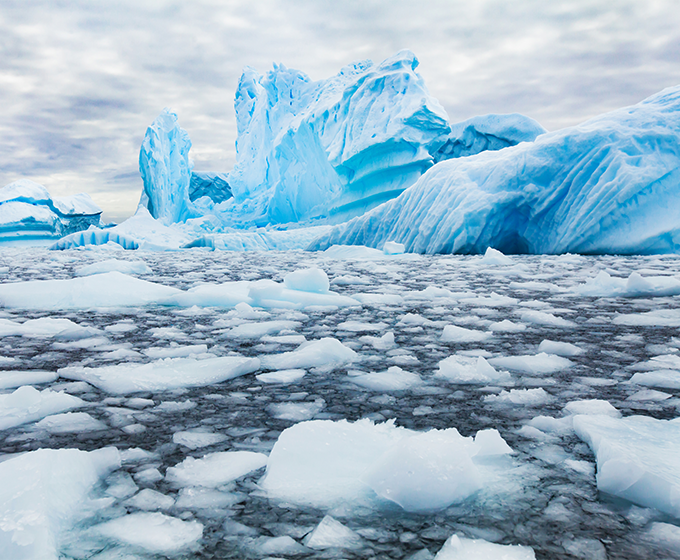
Antarctic sea ice, one of the research areas of the center.
AUGUST 13, 2020 — Ten K–12 teachers have participated in a two-day professional development workshop hosted by UTSA’s Center for Advanced Measurements in Extreme Environments in collaboration with the Dee Howard Foundation.
Funded by a NASA grant to the center, the virtual workshop responded to the revised Texas Essential Knowledge and Skills emphasis for more extensive engagement with earth and space sciences. TEKS are the state’s standards for what students know and should be able to do.
“We were excited to offer this opportunity for continuing education,” said Hongjie Xie, Department of Geological Sciences chair and the center’s director. “One of our goals in CAMEE is to inspire underrepresented students to pursue STEM careers. We hope that our K–12 teacher workshops provide teachers with the knowledge and resources to make science even more fun for their students.”
Faculty from the College of Sciences’ Department of Geological Sciences and the College of Engineering’s Department of Mechanical Engineering shared their expertise.
Attendees learned about hypersonic flight from Christopher Combs. They studied snow and ice elements of the cryosphere and remote sensing with Xie and Stephen Ackley. Kiran Bhaganagar discussed wildland fire education and shared how students can get involved with ongoing research. During Alberto Mestas-Nuñez’s overview of tropical Atlantic oceanic and atmospheric conditions, participants discussed the impacts of Hurricanes Harvey and Dorian. Each presentation included modules on technological, pedagogical and content knowledge.
Participant Sonia Cano, a seventh grade science teacher at Ronald McNair Middle School in Atascosa, said she valued the opportunity for professional development. “One of my personal core tenets as a science teacher is to inspire my students to discover the multitude of opportunities that STEM has to offer, while incorporating their own creativity in the discovery process,” she explained. “It was a rewarding opportunity to be able to network with professionals in their field.”
Jennifer Bault, a science teacher at Nicolet Union High School in Nicolet, Wisconsin, was both a participant and a presenter. Bault is also a teacher with PolarTREC, a research experience program funded through the National Science Foundation and administered by the Arctic Research Consortium of the United States. The organization pairs science teachers with scientists for real-world field-based research experiences.
In 2017 through PolarTREC, Bault accompanied Xie, UTSA professor Yongli Gao and collaborators from Columbia University’s Lemont-Doherty Earth Observatory on an NSF-funded Antarctic sea ice expedition to study Ross Sea ice production. In the field they joined another group of scientists from New Zealand and Germany.
⇒ Explore upcoming events and more about the Center for Advanced Measurements in Extreme Environments at UTSA.
Bault’s presentation demonstrated how she integrated her experiences from the expedition into her curriculum. “PolarTREC helped me to see the amazing opportunities that exist in science in polar areas,” she said. “I have become a better teacher as a result of my experience with PolarTREC. I now have the ability and wherewithal to expose young people to these possibilities.”
Bault said that the workshop deepened her knowledge in several areas. “I will be able to use much from the talk on hurricanes and wildfires as these directly tie into my AP Environmental Science curriculum,” she said. “Some of these pictures, charts and graphics will go into my own PowerPoints and fuel discussion with my students.”
UTSA Today is produced by University Communications and Marketing, the official news source of The University of Texas at San Antonio. Send your feedback to news@utsa.edu. Keep up-to-date on UTSA news by visiting UTSA Today. Connect with UTSA online at Facebook, Twitter, Youtube and Instagram.
Move In To COLFA is strongly recommended for new students in COLFA. It gives you the chance to learn about the Student Success Center, campus resources and meet new friends!
Academic Classroom: Lecture Hall (MH 2.01.10,) McKinney Humanities BldgWe invite you to join us for Birds Up! Downtown, an exciting welcome back event designed to connect students with the different departments at the Downtown Campus. Students will have the opportunity to learn about some of the departments on campus, gain access to different resources, and collect some giveaways!
Bill Miller PlazaJoin us for an intimate evening of cocktails, conversation, and culinary inspiration with Pati Jinich, Emmy-nominated chef and James Beard Award-winning author. Enjoy light bites and signature drinks in the warm, modern setting of Mezquite as Pati connects with guests over her passion for Mexican cuisine and storytelling.
Mezquite Restaurant in Pullman Market, 221 Newell Ave., San Antonio 78215From inspired courses to thoughtful pairings and a rich sense of community, the Ven a Comer Signature Dinner is a night of shared meals, shared stories, and unforgettable flavor.
Stable Hall (Pear Brewery), 307 Pearl Pkwy, San Antonio 78215Come and celebrate this year's homecoming at the Downtown Campus with food, games, giveaways, music, and more. We look forward to seeing your Roadrunner Spirit!
Bill Miller PlazaThe University of Texas at San Antonio is dedicated to the advancement of knowledge through research and discovery, teaching and learning, community engagement and public service. As an institution of access and excellence, UTSA embraces multicultural traditions and serves as a center for intellectual and creative resources as well as a catalyst for socioeconomic development and the commercialization of intellectual property - for Texas, the nation and the world.
To be a premier public research university, providing access to educational excellence and preparing citizen leaders for the global environment.
We encourage an environment of dialogue and discovery, where integrity, excellence, respect, collaboration and innovation are fostered.